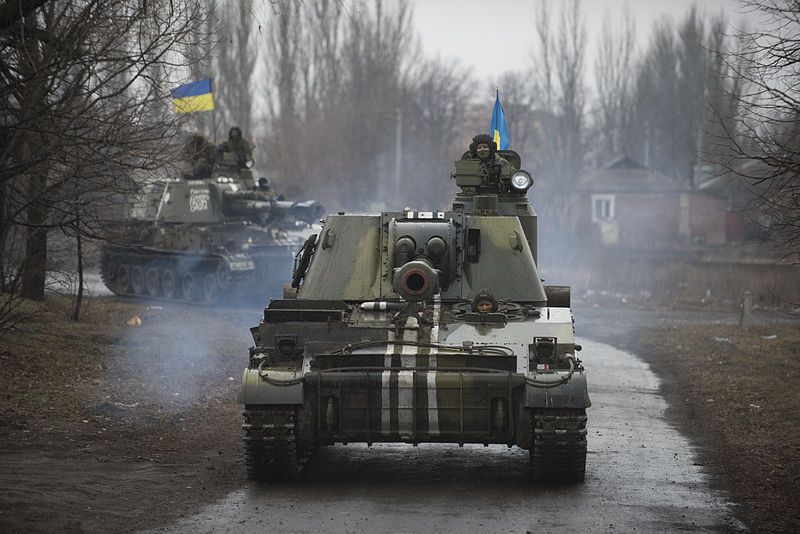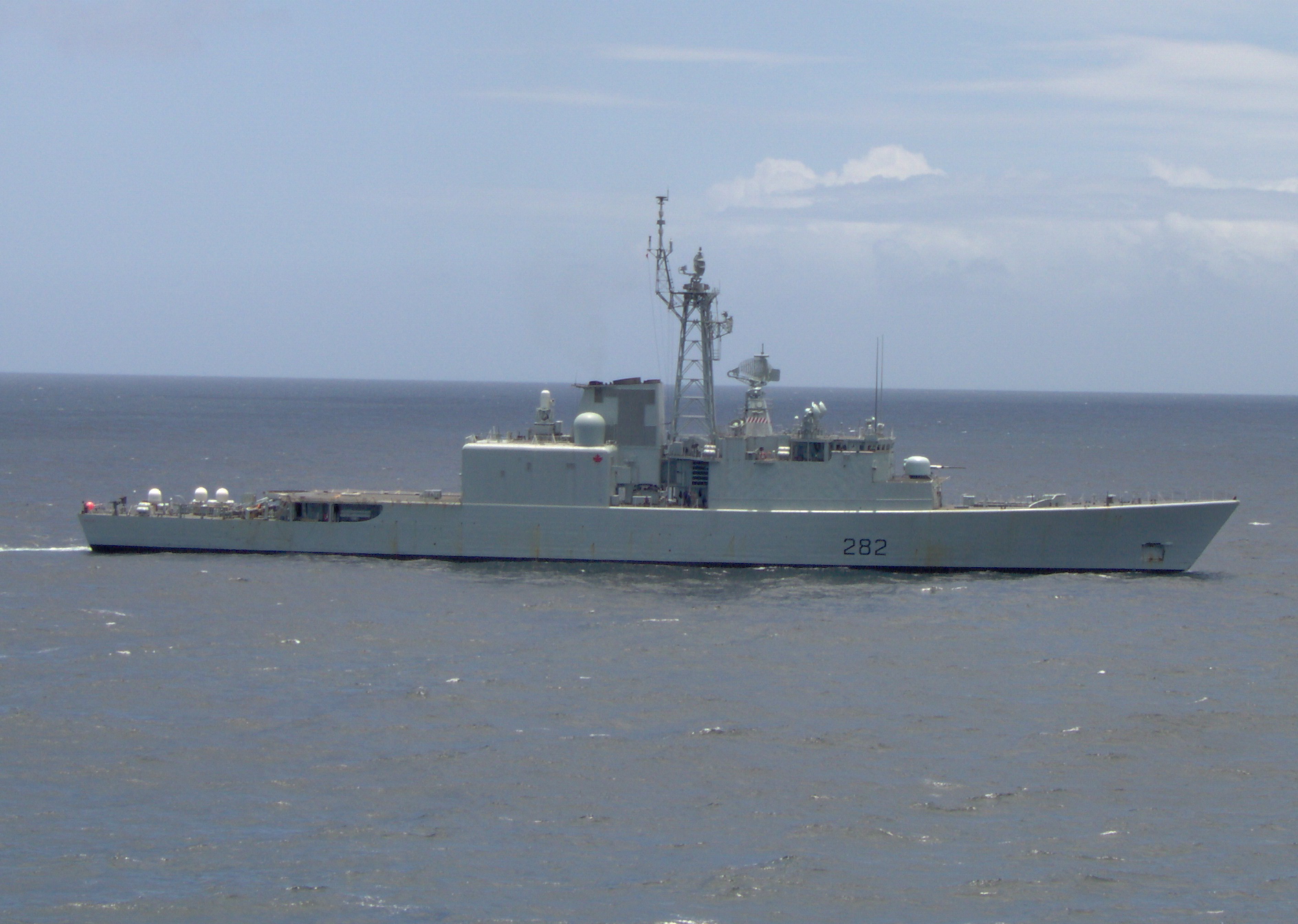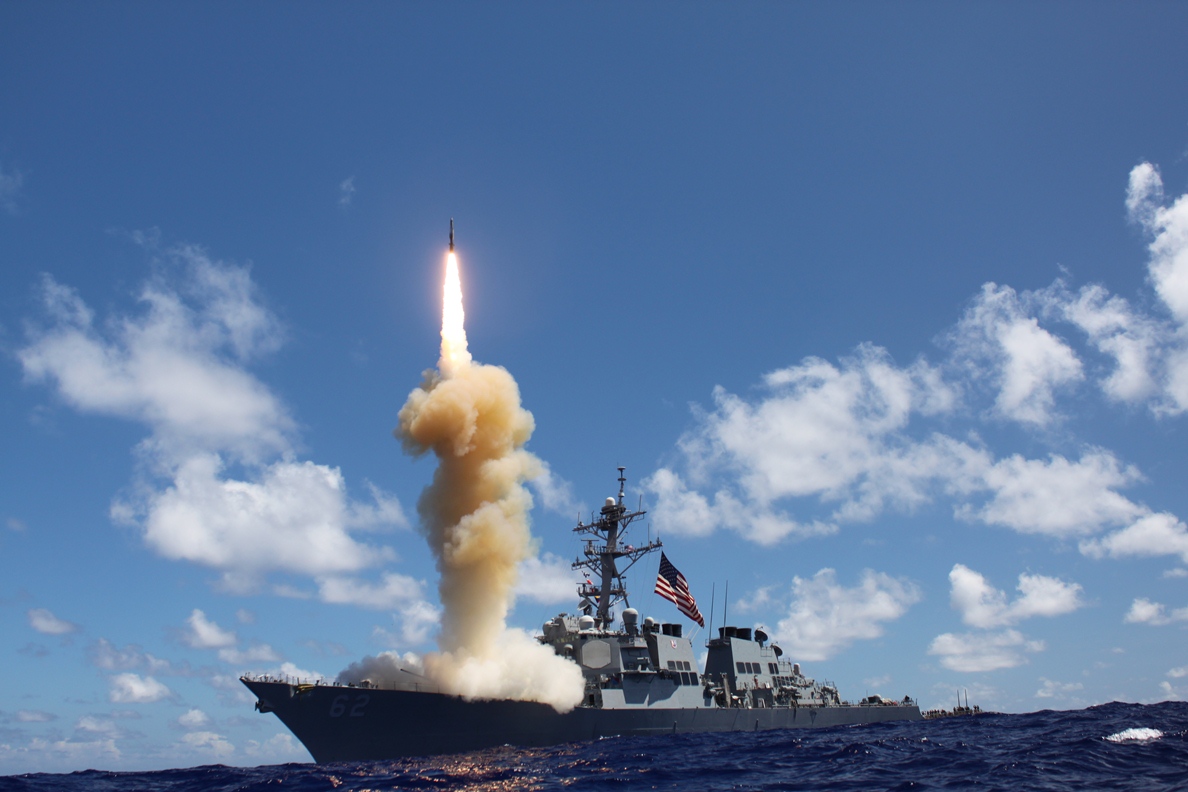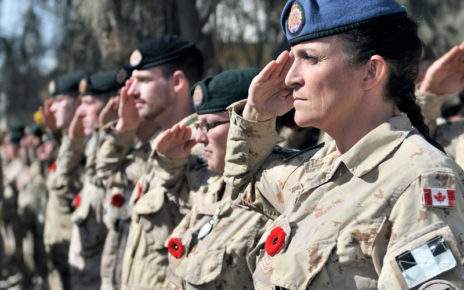In a four part series, the NATO Association of Canada discusses the advance of Russia and Ukraine’s bid to join NATO with Ukrainian Consul General Andrii Veselovskyi. The inaugural feature discusses the reality of Russian intervention in Central and Eastern Europe, and analyzes how western misconceptions and acquiesce have led to a negligent disregard of dangerous warning signs.
As I walk into the Ukrainian Consulate I feel conflicted. My identity as a human rights champion fights with my Hungarian heritage. I become overwhelmingly aware of my privilege to be Canadian and simultaneously feel the weight of my grandfather’s bravery to flee death camps and Russian occupation.
Reminiscing in the elevator is cut short when the doors open and a wave of embarrassment and uncertainty washes over me. I’m ashamed of how little I know of my own history and the current political context of Central and Eastern Europe. Consular General, Andrii Veselovskyi, kindly greets me and as I shake his hand, I prepare to confront my ignorance.
Banners with anti-Semitic messages hang in Hungary’s public squares, indigenous peoples are segregated and tortured in Crimea, while propaganda and nationalistic narratives permeate Central-European elections. It’s as if the faint beat of war drums fill the room as Consul Veselovskyi shares his concerns with me.
These are not concerns of decades past but rather the reality of Central and Eastern Europe. As we continue our discussion, the sounds of war drums fade and are replaced with the familiar clicks of keyboards in harmony with the bells of social media alerts- the modern sounds of warfare.
In an age of misinformation, I was attempting to decipher the true identity of Russia. A democratic fallacy, an empire in mourning of reigns past, a global threat, or an animal corned by the West lashing out in defence? Consul Veselovskyi explained that there is a detrimental reluctance in the West to accept that the Russia they knew no longer exists.
He explained that Canadians recognize that Venezuela is not free, they recognize Somalia as a deficient state, yet “the majority still view Russia as a normal country.” The label of normal connotes an underlying message of democracy, however Russia is a captive state.
Consul Veselovskyi continued his comparison to Venezuela, “Most see Venezuela as a market economy, you can buy, sell and promote business,” where the viability of success is based upon, “your skills and your money, up to the point you are not interested in politics. We recognize it is free in a business sense but not in a political sense. In Russia, there is less freedom, no economic freedom, no business, no political freedom.”
Markets, information, and individuals remain handcuffed to a bureaucracy that attempts to stamp out democratic ideals in the name of preserving “democracy”. Consul Veselovskyi says the democratic misnomer placed on Russia is inaccurate, rather, “Russia is a private state, run by a private bureaucracy, headed by a President.”
While the reality of his words were serious, his tone carried a hopefulness. A level of tact undoubtedly honed over years of diplomatic service, but more importantly informed by a reverent respect of history and her lessons.
Consul Veselovskyi charged me to look at the entire history of political relations in central Europe. I concluded that this moment of crisis is not new, rather it is a predictable pattern of centralizing power and increasing aggression.
The following is an analysis of unheeded warning signs discussed with Consul Veselovskyi and researched independently.
Warning 1: Religious Persecution and Segregation of Minority Populations
In early April, Russian authorities performed a sweep in Ufa, an industrial city in central Russia, permanently removing Jehovah’s Witnesses from their homes and unlawfully detaining individuals. The arrests and detainment of Jehovah Witnesses is an escalation in their attempts to repress the estimated 175,000 practicing individuals in Russia.
The campaign against Witnesses began in 2016, when legislation was passed outlawing missionary work and confining the espousal of religious beliefs to state-registered and state-monitored places of worship. Approximately a year later, Russia’s Supreme Court classified the Jehovah Witnesses as an extremist organization, therefore equating them to ISIS, and providing the state a wide degree of legal latitude to prosecute individuals under counterterrorism laws.
Crimean Tartars have faced similar persecution in the Crimean Peninsula since the Russian occupation began in 2014. Again under the guise of counterterrorism laws, Tartars, a Muslim ethnic minority indigenous to the Peninsula, have been harassed, attacked, removed from their homes, unlawfully detained and tortured. 26 individuals have been charged for involvement with Islamist movements, however, Human Rights Watch investigators determined the arrests are unfounded and instead part of Russia’s efforts to eliminate Muslims who preach and study Islam outside state guidelines.
Finally, members of the LGBTQ community have faced horrific and repeated violations of their human rights. In May 2017, a complaint filed in the International Criminal Court accused Chechnya of committing genocide after 26 gay and bi-sexual men were brutally murdered, some by their own families at the urging of officials. The purge was catalyzed by President Kadyrov declaring that he wanted all LGBTQ individuals in the country eliminated by May 26, 2017. The complaint also brought to light the operation of modern-day concentration camps in the region where gay men are unlawfully being held. Russia agreed to investigate human rights violations in the region, however Russia’s justice minister, Alexander Konovalov, told the United Nations on May 21,“The investigations that we carried out did not confirm evidence of rights’ violations, nor were we even able to find representatives of the LGBT community in Chechnya.”
Warning 2: Eliminating Civil Society and Media
Russia has systematically legislated the elimination of civil society. Human rights organizations have been labeled “foreign agents” or “undesirable organizations”. Once designated, the organizations can be liquidated by the government. Employees and supporters of the organizations are systematically targeted and harassed, with many being unlawfully detained and tortured.
Most recently, an international coalition including the OSCE and Civic Solidarity Platform expressed grave concern over a severe increase in torture and enforced disappearances of activists by the Russian Federal Security Service. Between October 2017 and January 2018, eight activists were arrested under vague counterterror laws and detained. Upon release the individuals confessed to crimes publically, however, it was later revealed that the confessions were extracted under extreme conditions including beatings, torture and prolonged isolation from relatives and legal counsel. The tactic of eliciting false confessions through torture is continually utilized by Russian officials to legitimize the use of counterterrorism laws to target civil activists.
Russia has now extended the label of “foreign agent” to international media outlets. The US listed RT, the state-run Russian TV network, as a foreign agent under the Foreign Agents Registration Act due to its propagandist content. Russia then retaliated by authorizing that all media outlets who receive financial assistance from foreign states or foreign organizations can be listed as foreign agents at the discretion of the Ministry of Justice. The move eliminates all outside sources of information and allows Russia to control all content and narratives presented to its citizens.
Russia has also extended its oversight to business and has thwarted attempts to introduce cryptocurrenties into Russia. The recently enacted legislation covers cryptocurrencies, blockchains, smart contracts, crypto mining and initial coin offerings; all such entities are now defined as property and therefore subject to government control. The bill states that digital assets can only be traded on authorized exchanges and will be subject to strict anti-laundering and terrorism financing laws. The strict regulations are likely to eliminate Russia as a market for such currencies.
Warning 3: Territorial Advances and Ramping up of Arms
In August 2008, Russia launched its first major advance into sovereign territory, deploying approximately 30,000 soldiers to the provinces of South Ossetia and Abkhazia. In 2009 the EU released a report accusing both sides of international violations, but concluding Georgia had initiated the conflict. Russia remains embroiled in the conflict due to allegations of war crimes and human rights violations during the invasion.
The war crimes hearing is currently before the European Court of Human Rights. The Court has heard evidence that Russia carried out over 100 air attacks on civilian targets resulting in dozens of deaths, as well as systematically burning down homes and entire villages in South Ossetia. Those who refused to leave were threatened or summarily executed. This evidence is in addition to the 30 witness testimonies provided in 2016 that detailed the alleged ethnic cleansing of 20,000 Georgian villagers in South Ossetia, the torture of prisoners, and the deadly rocket attack on the town of Gori that killed 11 civilians and Dutch journalist, Stan Storimans.
Russia has stated it will ignore the rulings from Strasbourg should it contravene the country’s constitution. Russia has also stated the proceedings are biased and denies allegations of any wrongdoing.
Russia has further denied involvement in the rocket attack that shot down Malaysia Airlines flight MH17 over the Ukraine in July 2014 that resulted in the deaths of all 298 aboard. However, the investigation into the incident, headed by the Joint Investigation Team, concluded May 24, that the rocket undeniably came from a Russian based military unit. The investigation has stated they are now moving into the final phase to prepare for prosecution.
The rocket attack inflamed tensions during the 2014 Crimea Invasion that resulted in the deaths of thousands and displaced over a million people. Crimea remains occupied and under a governance structure similar to Russian regions or provinces, however Consul Veselovskyi points to two alarming differences.
In Crimea, the military presence is five times that of any other region in Russia. Further, the area has become incredibly militarized with the weaponry at a significantly higher quality and modernity than other territories in Russia.
Consul Veselovskyi expressed concerns of further advancement by Russia into non-NATO member states, providing the recent aggressive condemnation of Kazakhstan as an example.
Kazakhstan had agreed to a one-year deal with the US to provide an airfield and storage facilities for supply deliveries to American troops stationed in western Afghanistan. Russia immediately portrayed the deal as a criminal act and attempted to reign in Kazakhstan issuing aggressive condemnations of the government. Consul Veselovskyi says this illustrates the remanence of imperialist thinking that drives the expansion and aggression of Russia.
The return of historical tactics, such as the poisoning of Sergei Skripal and his daughter, using a rare nerve agent developed in Russia, have been combined with modern cyber-warfare advances that have made Russia a threat to democratic institutions and practices internationally.
In the recent US Presidential election Russia publish leaked materials and coordinated massive campaigns of disinformation through social media platforms in a successful attempt to divide the nation and inflame partisan affiliations. However, the NSA has confirmed that Russian hackers were closer to the heart of democracy than previously believed after it was verified attempts were made to access the credentials of employees at the tech firm responsible for the sale of the equipment and software used for voter registration.
The advance and increased capabilities of Russia has put unlikely states in the crosshairs including Canada and Norway. Rear Admiral Nils Andreas Stensoenes, Chief of the Royal Norwegian Navy, expressed concerns over the increased activity of Russian naval forces off the coast of Norway. Russia has demonstrated the ability to reach key Norwegian targets by air, land and now sea, with Russian naval activity in Europe now exceeding Cold War levels.
The Kremlin has also relaunched its nuclear naval program and re-opened military, air and radar bases in addition to constructing new outposts on remote Arctic islands. There are now a total of 19 Russian bases within reach of the Canadian border.
Canadian defenses are asymmetric in the region. Russia has 40 breakers, six of which have nuclear capabilities, while Canadians have limited armed troops on the border, raising concerns given the aggressive advancement of Russia in Europe and the wealth of undiscovered oil and gas in the Arctic which amounts to 22 percent of the world’s reserves.
Concentration camps, aggressive invasions, and a vast increase in arms, were the warning signs Winston Churchill articulated in newspaper articles in the late 1930s. The imagery is eerily reminiscent of horrors past, including the international reaction to Russia’s advancement.
As Consul Veselovskyi has warned, the failure of the international community and media to view Russia as a captive state means these warnings go unheeded. Delicate diplomacy leaves international states at a disadvantage in stemming the advance of Russia, as they are confined by the rules of international law while Russia runs lawless over neighbouring states.
International law should not hinder diplomatic efforts, but embolden the international response against Russia. Accurately labelling both Russia and their acts against humanity provides a foundation for international organizations and alliances to begin pushing back against the growing threat; while championing and preserving the ideals of democracy and the rule of law.
Theorizing Russia’s motives provides a rationale for the denial of basic human rights and catalyzes similar actions in other states such as Hungary, Belarus and Poland. The necessity to defend one’s country does not legitimize war crimes. Failing to acknowledge such crimes further denies justice to those who have died and encourages Russia to continue their deadly advance. Appeasement and acquiescence are no longer acceptable by the international community.
I have felt the consequences of appeasement. I have stood on the train platform where my grandfather waved goodbye to his parents as they were transported to their deaths. That day I stood in front of the Ukrainian Consulate a free citizen, the grand-daughter of an engineer who escaped Russia’s grip many years ago.
How horrible, fantastic, incredible it is, that we should be digging trenches and trying on gas-masks here, because of a quarrel in a faraway country between people of whom we know nothing…However much we may sympathise with a small nation confronted by a big and powerful neighbour, we cannot in all circumstances undertake to [be] involved… If we have to fight, it must be on larger issues.
Within seven years of Prime Minister Chamberlain’s statement, 73 million were dead. There is no larger issue than the fundamental rights of humanity and the foundations of democracy.
As I stand to leave the Consulate, the same sorrowful chill I felt on a train platform in Hungary fills me. There is a silent but shared understanding of the reality we have just discussed. Consul Veselovskyi shares a final proverb, “The fortress was destroyed but not uprooted.”
He still carries hope in his diplomacy. I ask before departing, “What is the solution?” He answers with a deep confidence in humanity, “the world and NATO.”
Photo: OSCE SMM monitoring the movement of heavy weaponry in eastern Ukraine (2015), by OSCE Special Monitoring Mission to Ukraine. Liscenced under CC BY 2.0.
Disclaimer: Any views or opinions expressed in articles are solely those of the
authors and do not necessarily represent the views of the NATO Association of
Canada.




